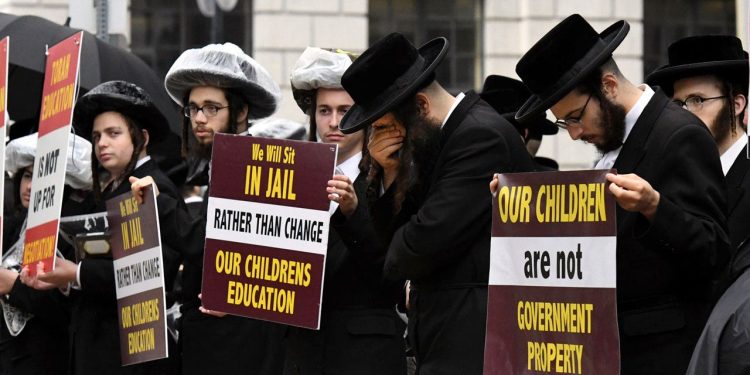
Parents cannot be required to pull their children from private schools in New York that fail to meet state-designated standards, a judge decided, striking down a key provision of rules recently passed to strengthen oversight of such schools, including those specializing in religious education.
The ruling in a state trial court in Albany came in response to a lawsuit brought by ultra-Orthodox Jewish schools, called yeshivas, and related advocacy groups over education rules enacted last fall. Under the rules, the state’s 1,800 private and religious schools must provide an education that is ‘substantially equivalent’ to that of a public school.
Opponents in the ultra-Orthodox community say the rules improperly target yeshivas, some of which focus intently on religious instruction with far less teaching in secular subjects such as English, math and science.
Judge Christina Ryba on Thursday rejected an argument that the state regulations were unconstitutional. But she said state officials overstepped their authority in setting penalties for schools that don’t adhere to them.
Specifically, she said education officials lack legal authority to make parents take their children out of schools that fall short of the requirements, and they don’t have the authority to order that those schools be closed.
Ryba said parents of those children could still receive required instruction in combination with sources, such as home schooling.
A co-plaintiff cheered the judge’s rejection of the ‘draconian penalties.’
‘In striking those provisions of the regulations, the Court agreed with parents and non-public schools across New York State who opposed these regulations,’ read a prepared statement from the group Parents for Educational and Religious Liberty in Schools.
The state Education Department said the decision validates its commitment to improving the educational experience for all students.
‘We remain committed to ensuring students who attend school in settings consistent with their religious and cultural beliefs and values receive the education to which they are legally entitled,’ read the prepared statement.
It was not clear if any aspects of the ruling would be appealed.

Parents cannot be required to pull their children from private schools in New York that fail to meet state-designated standards, a judge decided, striking down a key provision of rules recently passed to strengthen oversight of such schools, including those specializing in religious education.
The ruling in a state trial court in Albany came in response to a lawsuit brought by ultra-Orthodox Jewish schools, called yeshivas, and related advocacy groups over education rules enacted last fall. Under the rules, the state’s 1,800 private and religious schools must provide an education that is ‘substantially equivalent’ to that of a public school.
Opponents in the ultra-Orthodox community say the rules improperly target yeshivas, some of which focus intently on religious instruction with far less teaching in secular subjects such as English, math and science.
Judge Christina Ryba on Thursday rejected an argument that the state regulations were unconstitutional. But she said state officials overstepped their authority in setting penalties for schools that don’t adhere to them.
Specifically, she said education officials lack legal authority to make parents take their children out of schools that fall short of the requirements, and they don’t have the authority to order that those schools be closed.
Ryba said parents of those children could still receive required instruction in combination with sources, such as home schooling.
A co-plaintiff cheered the judge’s rejection of the ‘draconian penalties.’
‘In striking those provisions of the regulations, the Court agreed with parents and non-public schools across New York State who opposed these regulations,’ read a prepared statement from the group Parents for Educational and Religious Liberty in Schools.
The state Education Department said the decision validates its commitment to improving the educational experience for all students.
‘We remain committed to ensuring students who attend school in settings consistent with their religious and cultural beliefs and values receive the education to which they are legally entitled,’ read the prepared statement.
It was not clear if any aspects of the ruling would be appealed.
















